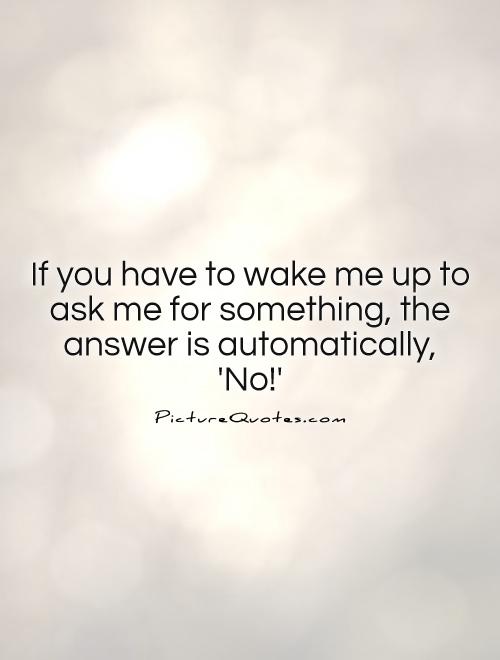If you have to wake me up to ask me for something, the answer is automatically, 'No!'

If you have to wake me up to ask me for something, the answer is automatically, 'No!'
"Wake up words" are a set of rules or guidelines that are established to govern how and when someone can approach another person for a favor or request. The phrase, "If you have to wake me up to ask me for something, the answer is automatically, 'No!'" is a common example of a wake-up word that sets boundaries and expectations for when it is appropriate to make requests of someone.This phrase is often used to convey the idea that interrupting someone's sleep or rest should only be done in cases of emergency or urgent need. By establishing this rule, the person is setting a clear boundary that their sleep and rest are important and should not be disturbed unless absolutely necessary.
There are several reasons why someone may choose to implement this wake-up word. Firstly, sleep is essential for overall health and well-being. Interrupting someone's sleep can have negative effects on their physical and mental health, leading to fatigue, irritability, and decreased cognitive function. By setting a rule that requests should not be made while someone is sleeping, the person is prioritizing their own health and well-being.
Secondly, setting boundaries around when requests can be made can help to establish a healthy and respectful relationship between individuals. By respecting someone's need for rest and not disturbing them unnecessarily, it shows that you value and care for their well-being. It also helps to prevent resentment or frustration from building up over time, as constantly being interrupted or disturbed can lead to feelings of annoyance or anger.
Overall, the phrase "If you have to wake me up to ask me for something, the answer is automatically, 'No!'" is a powerful wake-up word that can help to establish boundaries, prioritize self-care, and promote healthy relationships. By respecting someone's need for rest and setting clear guidelines for when requests can be made, individuals can create a more harmonious and respectful environment for all parties involved.












 Friendship Quotes
Friendship Quotes Love Quotes
Love Quotes Life Quotes
Life Quotes Funny Quotes
Funny Quotes Motivational Quotes
Motivational Quotes Inspirational Quotes
Inspirational Quotes